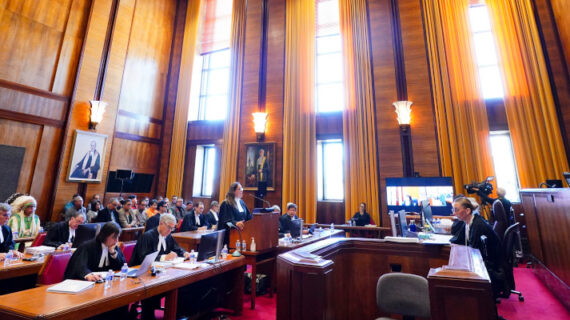- The U.S. Trade Representative Katherine Tai has “expressed concern” about Canada’s pending legislation for online news that could “discriminate against U.S. businesses.”
- The Computer & Communications Industry Association, says the bill “imposes an undue and discriminatory burden on one set of clearly targeted market participants..."
- “The likelihood of the U.S. Government actually bringing a CUSMA case if C-18 becomes law are somewhere between very slight to zero. And if they did, the case would almost certainly fail,” wrote Hugh Stephens.
A few words in a press release from U.S. President Joe Biden’s top trade adviser about hot-button Canadian legislation went mostly unnoticed last year but could have big implications for the government’s efforts to make Big Tech compensate the news media.
After a private meeting with Canada’s Minister of International Trade Mary Ng, the U.S. Trade Representative, Katherine Tai, said she had “expressed concern” about Canada’s pending legislation for online news that could “discriminate against U.S. businesses.”
Critics of the bill seized on it as another unintended consequence of a plan that has now seen Meta remove Canadian news from its Facebook and Instagram platforms and Google vow to do the same on its search services.
Will the legislation, which the government says is designed to keep Canadian news businesses afloat in a changing digital world, really find the two allies facing off at a trade tribunal? It depends on who you ask.
The U.S. hasn’t raised the issue publicly since last year and, although the United States Embassy in Ottawa has expressed specific concerns about the government’s online streaming bill, it would only say that it was monitoring the impact of the online news legislation.
“We are continuing to watch developments around the implementation of Bill C-18 and encourage Canada to consider U.S. stakeholder input as it implements this bill,” said Ariel Pollock, a U.S. Embassy spokesperson in Canada, in a statement to The Hub.
The recently passed law requires that Google and Meta enter into voluntary agreements with Canadian news media organizations to compensate them for their content or face binding agreements imposed by the Canadian Radio-Television and Telecommunications Commission.
The Computer & Communications Industry Association, which is a lobbying group that includes Google and Meta, has argued that the structure of the bill “imposes an undue and discriminatory burden on one set of clearly targeted market participants in the country’s news industry: U.S. Internet platforms.”
“The discriminatory nature of the bill likely runs afoul of several of Canada’s trade commitments, leaving Canada vulnerable to potential retaliation,” the advocacy group argued.
It could be that the white paper found an audience in Washington. It was released in September of last year and Tai expressed her concern about the Online News Act to Ng two months later.
Tai’s comments and the lobbying white paper didn’t go unnoticed in the United States either. The News Media Alliance expressed “serious concerns” about the meeting with Ng and the comments made about the media bill, arguing that Tai was prioritizing the interests of a few large companies over the interests of the whole United States.
The News Media Alliance argued that Canada’s bill, which is based on legislation passed in Australia, could become a global model that could have “transformative effects” on the industry.
“The fact that many of the dominant companies engaging in these damaging practices, and therefore affected by the legislations, are incorporated in the United States does not make these laws discriminatory,” wrote Danielle Coffey, the executive vice president and general counsel of the News/Media Alliance.

Hugh Stephens, an executive fellow at The University of Calgary’s School of Public Policy, wrote that he wasn’t convinced by the CCIA’s white paper about the Online News Act.
“I will give the authors an ‘A’ for creativity in terms of the range of objections they manage to roll out, but an ‘F’ for making a convincing argument,” Stephens wrote, on The School of Public Policy’s website.
“The likelihood of the U.S. Government actually bringing a CUSMA case if C-18 becomes law are somewhere between very slight to zero. And if they did, the case would almost certainly fail,” wrote Stephens.
Michael Geist, Canada Research Chair in internet and e-commerce law and a law professor at the University of Ottawa, wrote that the bill could be an issue even if it doesn’t end up at a tribunal.
“While there may be a debate about the likelihood of success in a trade challenge, the fact that the U.S. has now repeatedly raised the issue suggests that Canadian digital policy is fast becoming a major trade irritant that is unlikely to go away,” wrote Geist.
“Even without a formal legal challenge that represents a cost to Canada as it may ultimately stymie other trade priorities as the issue escalates within the U.S. administration and Congress,” he wrote.




